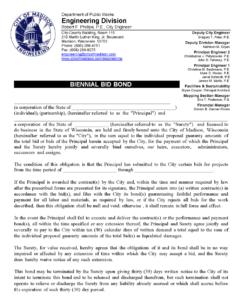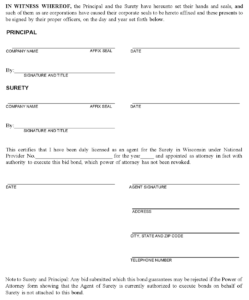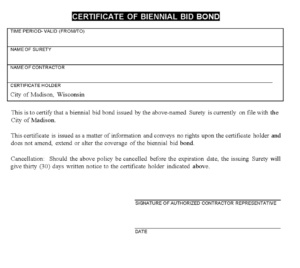What is an annual bid bond and how is it different from a standard bid bond? Usually, bid bonds are written on a project-specific basis. A contractor provides a new bid bond to the Obligee (Owner or contractor asking for the bond) along with each bid proposal. You can read more about standard bid bonds here. However, many states and municipalities are moving or have moved to annual bid bonds.
What is an Annual Bid Bond?
An annual bid bond functions in the same way a regular bid bond does. Instead of providing a new bid bond with each project, the contractor files it once annually with the Obligee and they are covered on projects bid throughout the year. Usually the Obligee has an electronic bidding system and the surety bond broker is required to input the annual bid limits. These bid bonds are then verified by the surety bond company. For example, a contractor may have a 5% annual bid bond with a $10 million limit that the surety bond broker files with an Obligee. The contractor would then be allowed to bid projects for a twelve-month period to that Obligee without submitting a new bid bond so long as the bids do not exceed the $10 million set limit.
The annual bid bond guarantee is still the same as a regular bid bond. Should the contractor have the winning bid, the Obligee will expect that contractor to enter into a contract and provide a performance bond and payment bond. If the contractor cannot or will not, a claim can then be made on the bid bond. You can read more about bid bond claims here.
How About Biennial Bid Bonds?
Some Obligee are even taking this a step further and going to a biennial bid bond. An example of this would be the City of Madison, Wisconsin. You can see their form here or in the pictures at the end of this article. Instead of filing a new annual bid bond every twelve months, these bid bonds are replaced every twenty-four months.
Advantages of Annual Bid Bonds
A big advantage of annual bid bonds is that it allows the Obligee to prequalify the contractor and their surety bond company one time. Usually this takes place long before the bid is ever submitted. Often these electronic systems can help verify the bond and reduce fraud.
Another advantage is that the contractor does not have to turn in a physical surety bond. Many Obligees now allow electronic bid submissions but they still require a hard copy of the bid bond. With annual bid bonds, the bond is already on file so contractors can easily turn in bids from very far away. It’s also a great benefit if the weather is bad and the contractor cannot get to the letting to turn in a hard copy.
Disadvantages
Annual bid bonds can be a disadvantage for contractors who are coming out of a rough period or are new to surety bonding. Surety bond companies may not be comfortable extending this type of credit to these contractors and often prefer to underwrite each project individually.
The other disadvantage is cost. Usually, the contractor will have to purchase an annual membership to use the electronic software. This cost can almost always be offset by savings in other areas such as reduce travel to lettings, etc. but we still mention it. Like most bid bonds, the annual bid bond itself usually has no cost.
Underwriting is Still Required
Keep in mind that even with an annual bid bond, the surety bond company still wants to underwrite the contractor and their projects. Most surety bond companies will still require the contractor to stay within the limits of their broker’s surety line of credit or get approval before bidding on any projects. Like any project, you should still let discuss challenges, long term warranties, design-build, etc with your surety bond company first. Additionally, we like to remind contractors that annual bid bonds, like all surety bonds, are a product of indemnity. That means, the surety bond company expects no claims and will seek reimbursement from the contractor and indemnitors if a valid claim happens. You may read more about indemnity here.
We will likely continue to see more Obligees on a local and national level go to annual bid bonds as it often makes bidding easier. In fact, it is now a standard process for many states’ Department of Transportation. Contractors should be familiar with what an annual bid bond is and how to get one. MG Surety Bonds can work with any electronic bid system and we can file bid bonds in all 50 states. Please contact us if you need assistance.




